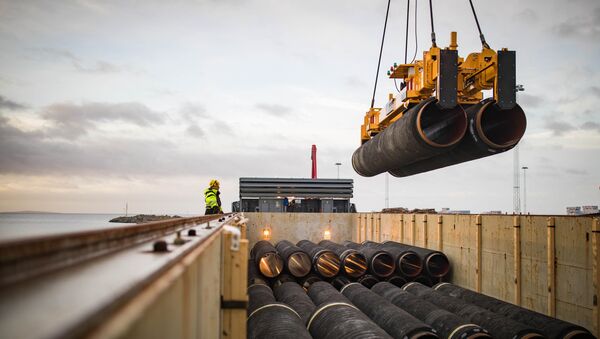Denmark's Liberal Defense Minister Claus Hjort Frederiksen has rejected the US-led speculations that the underwater pipeline may be ultimately used for spying on the West, the daily newspaper Jyllands-Posten reported.
"I don't think it's considered a realistic perspective in Danish intelligence circles," Claus Hjort Frederiksen was quoted as saying during a meeting with his NATO colleagues. "We don't believe that the spy angle has a role," Hjort Frederiksen added.
In doing so, the Danish defense minister dispelled the US espionage concerns expressed by the US State Department several weeks ago.
READ MORE: Swedish Government Approves Construction of Nord Stream-2 Pipeline
In mid-May, deputy assistant Secretary of State for energy diplomacy Sandra Oudkirk stressed that the Baltic Sea was a "congested, sensitive military area," voicing the US concern for "the ability of governments and companies to use infrastructure deployments as a means to convey devices and technologies that can listen and follow and monitor" with regard to a "particular undersea pipeline project." Oudkirk went so far as to suggest that the project would allow for new technology to be placed along the pipeline route, which she called a "threat."
When directly confronted by Jyllands-Posten on whether the alliance shares the US fears, NATO Secretary General Jens Stoltenberg said that there were "different" views on this matter among the allies.
READ MORE: How US is Twisting EU's Arm, Trying to Throw Wrench Into Nord Stream 2
Nord Stream 2 AG spokesperson Jens Müller assured in February that the spying fears were totally groundless. According to Müller, the underwater part of North Stream will include steel pipes encased in a reinforced concrete shell, with no opportunity for placing tracking or monitoring equipment.
Nord Stream 2's application includes a part of the pipeline which will pass through Danish territorial waters south of Denmark's easternmost island of Bornholm. Denmark still has the formal option of rejecting the application, should the government conclude that the pipeline will weaken Denmark's foreign security or defense policy interests. The application has been under investigation since January, with the final decision yet to arrive.
READ MORE: Danish Parties Call for Sanctions Against Putin, Nord Stream 2
The Nord Stream 2 project includes two gas pipelines that will run from the Russian coast through the Baltic Sea to a hub in Germany. It is a joint venture between Russian energy giant Gazprom, French Engie, Austrian OMV AG, UK-Dutch Royal Dutch Shell, and German Uniper and Wintershall.
The projected annual capacity of the pipeline is 55 billion cubic meters of gas, whereas the cost of the project has been estimated at almost 10 billion euros.


